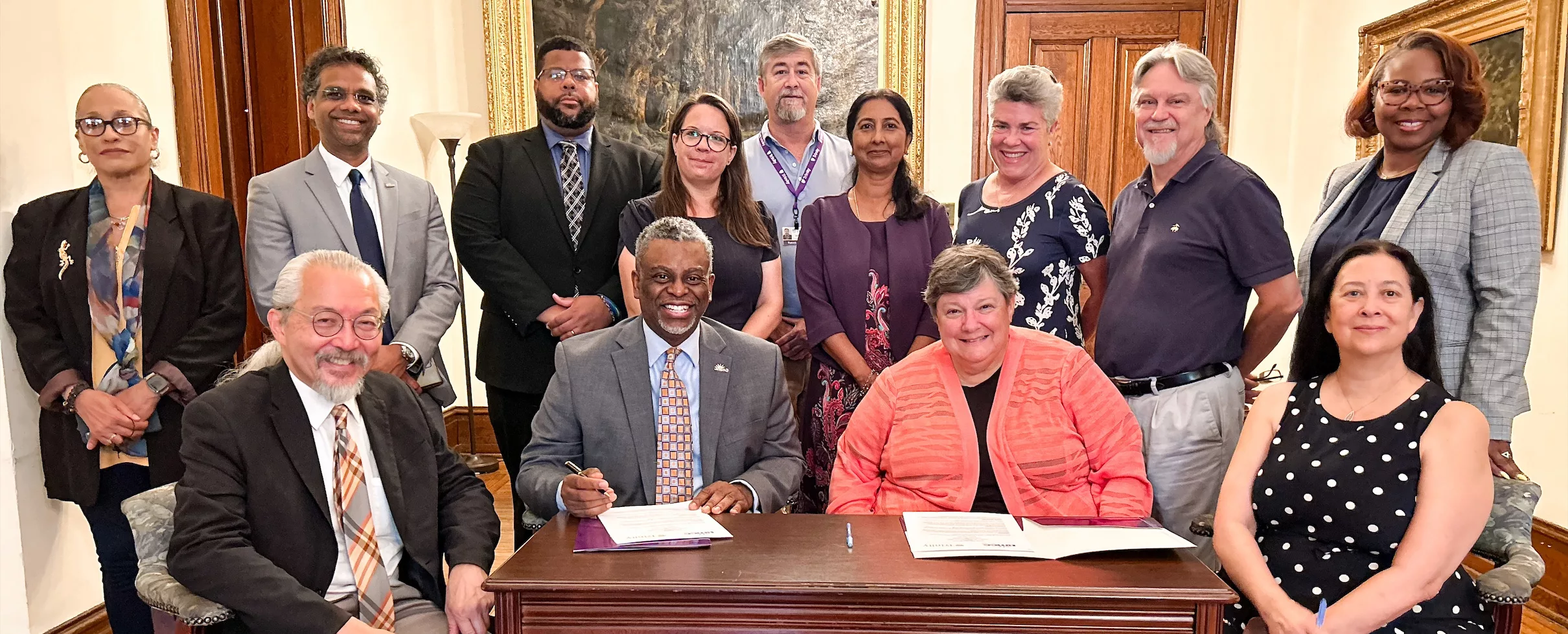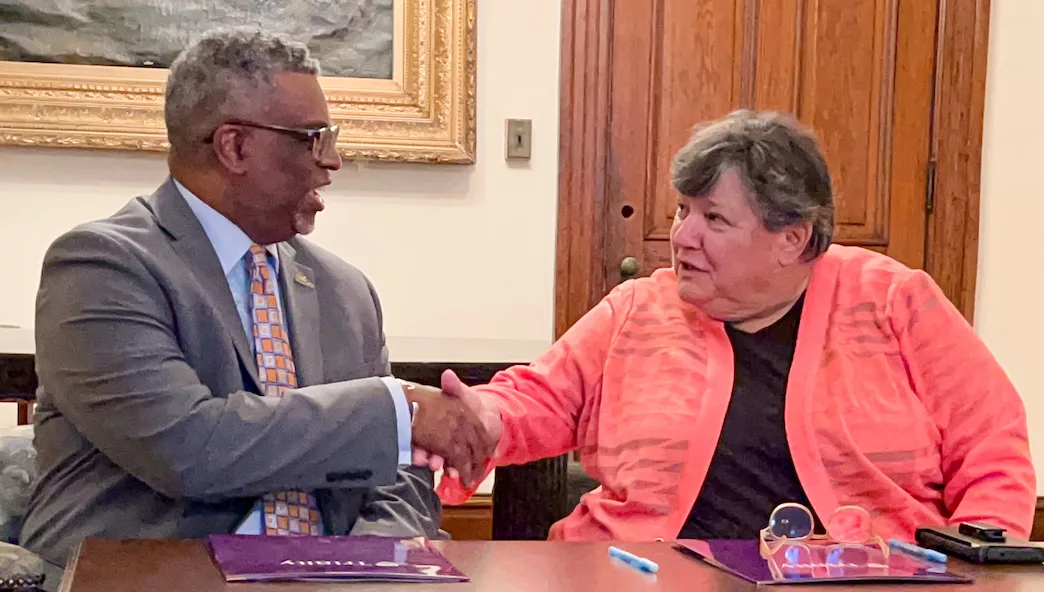
Affirming Higher Ed for All

Signing Ceremony with colleagues from the Borough of Manhattan Community College and Trinity
July 25, 2023
L to R Front Row: BMCC Provost Erwin J. Wong; BMCC President Anthony E. Munroe;
Trinity President Pat McGuire; Trinity Provost Carlota Ocampo;
L to R Back Row: Karen Wilson Stevenson, BMCC VP Advancement; Sanjay Ramdath, BMCC VP Enrollment;
Christopher Shultz, BMCC VP Institutional Effectiveness and Strategic Planning; Debbie Van Camp, Trinity VP Academic Asessment; Patrick Kellogg, TrinityVP Development; Sita Ramamurti, Trinity Dean of the College of Arts & Sciences;
Brigid Noonan, Trinity Dean of the School of Nursing and Health Professions;
Thomas Mostowy, Trinity Dean of the School of Professional and Graduate Studies; Victoria Nichols, Trinity VP Admissions
(Photo by Robert Spriggs)
________________________________________________________________________________________________
I am pleased to announce the formation of a terrific new partnership between Trinity and the Borough of Manhattan Community College. On July 25, 2023, we entered an articulation agreement that will give BMCC students who have earned their associate degrees a seamless pathway to come to the nation’s capital to advance into baccalaureate and graduate education at Trinity. BMCC President Anthony E. Munroe and Provost Erwin J. Wong believe it is very important for their students to have many pathways to continue their education, and they have formed similar partnerships with other universities around the country and even internationally. BMCC was the first community college in New York City and it is the largest unit in the CUNY system.
At the signing ceremony (photo above), President Munroe said, “Today is historic for both BMCC and Trinity Washington University – two venerable institutions with long-standing commitments to transforming people and communities. BMCC and Trinity prepare leaders, many of whom are Black and Hispanic—and women — to make significant contributions in society. At BMCC, we strive to equalize access to a quality education, careers with family sustaining wages, and an enhanced quality of life. We are proud to strengthen this commitment with our collaboration with Trinity Washington University.” Both Trinity and BMCC are Minority Serving Institutions (MSIs) as designated by the U.S. Department of Education; both are Hispanic Serving Institutions and Trinity is also a Predominantly Black Institution.
The urgent importance of opening seamless pathways for students of color to advance through higher education was a major theme of the National Summit on Equal Opportunity in Higher Education that took place at the U.S. Department of Education on July 26, the day after we signed the BMCC agreement. I was proud to carry our message to that gathering, and as I listened to Secretary of Education Dr. Miguel Cardona, I felt he was telling the Trinity story. Secretary Cardona’s speech was a reflection of the need to rise in response to the Supreme Court’s recent decision banning affirmative action in admissions at elite institutions. Most of the universities in the room were not the elites, but rather, those like Trinity who are already educating majorities of students of color. Secretary Cardona urged us, “We need the same relentless commitment to equal opportunity and justice courageously displayed by leaders at the height of the civil rights movement—an effort to create a more perfect union. Our country has long struggled to live up to the promise of equality and opportunity for all. And every generation is called upon to renew that promise. Now, it is our turn.”
Secretary Cardona called on universities to do more to create seamless pathways for students from high school into college (dual enrollment, early college), and to “solve the nightmare that is transfer” by making transfer among schools seamless, and particularly from community colleges into baccalaureate programs. When my turn came to speak on one of the panels, I was proud to be able to respond directly to the Secretary by discussing Trinity’s dual enrollment and early college programs — and to announce our new transfer partnership with BMCC.
Effective transfer agreements are extremely important to encourage students who start out in community college programs to continue their education at advanced degree levels. A significant proportion of community college students are low income students of color, student who can be easily discouraged by the bureaucracy, cost and even snobbishness of more traditional educational institutions. That’s the problem inherent in the Supreme Court’s decision in the Harvard case, a decision that turns a blind eye to all of the hurdles that low income students of color already face in persisting through college degrees. The Court seemed agnostic about the fact that wealthier students, predominantly white students, have their own form of “affirmative action” through legacy admissions, special interest admissions for donor children, and athletics admissions that often give both special access and full ride scholarships to students from private schools who learn to excel in minor sports. The playing field simply is not level at all, and the Supreme Court’s careless use of “colorblind” analysis completely ignore the effects of the historic and still-prevalent racism that continues to limit opportunities particularly for Black and Hispanic students at elite universities.
Trinity has other articulation agreements (see below) and we aim to make transfer a seamless as possible for all students. The BMCC relationship is particularly important because it is our first articulation agreement with a college from another city, and we hope to expand our network in the future with other partners around the country. As our BMCC partners made clear, the opportunity for students to study in Washington is fantastic, and Trinity can be a welcoming home for students from New York and elsewhere who want to explore the opportunities to study, learn and grow in the nation’s capital.
Our BMCC articulation agreement includes these programs — and thank to Provost Ocampo and Deans Ramamurti, Noonan and Mostowy for aligning the curricula to ensure seamless credit transfers:
Programs Included in the BMCC/Trinity Articulation Agreement:
| BMCC Program | Degree | Trinity Washington University Program | College Unit | Degree |
| Business Administration | AS | Business Administration | CAS | BA |
| Business Administration | AS | Business Administration | SPS | BS |
| Criminal Justice | AA | Criminal Justice | CAS | BA |
| Criminal Justice | AA | Criminal Justice | SPS | BA |
| Liberal Arts | AA | Various Programs | CAS & SPS | BA/BS |
| Nursing | AAS | RN-BSN (On-line) | NHP | BSN |
| Psychology | AA | Psychology | CAS | BA |
| Psychology | AA | Psychology | SPS | BA |
| Public Health | AS | Public Health | NHP | BS |
We will shortly post a new web page providing more details on the process for students to apply through the BMCC articulation pathway.
Trinity’s other articulation agreements include these:
| Articulation Partnerships for Transfer Admissions | |
| Northern Virginia Community College
Current agreement in perpetuity |
Provides guaranteed admission for students meeting criteria.
Students completing an AA (Associate of Arts) are awarded all lower division courses (general education) at Trinity (“block transfer”). |
| Montgomery College
Current: Global Affairs-CAS active as of 2022 CJUS-SPS active as of 2017 RN-BSN active as of 2016 |
New agreement signed in April 2022 between MC and Trinity Global Affairs.
The CJUS transfer pathway articulates an earned AAS in Criminal Justice to an SPS degree within 120 credits. |
| Prince Georges Community College
Current as of 2019: AAS in Health Information Tech, Medical Asst & Radiography to BA in Health Services for both CAS/SPS Current as of 2018: AA to BA in Early Childhood Education in SPS |
Provides guaranteed admission for students meeting criteria, and ensures that general education requirement courses at PGCC will transfer to Trinity. |
| Howard Community College
Current: RN-BSN as of 2018 |
RN-BSN lays out a transfer pathway showing the courses required for an AA in Nursing and a BSN at Trinity. |
| College of Southern Maryland
Current as of 2015: AS to BSN |
Provides guaranteed admission to Trinity for students meeting criteria and outlines a systematic plan for student to continue beyond the AS degree through collaboration between CSM and Trinity’s BSN program. |
Final note: how did Trinity’s partnership with BMCC come about? Well, that is a story! Before the pandemic, I was invited by our study abroad partner CIEE to attend a meeting of MSIs in Barcelona. Barcelona! I rarely go on such trips, but this seemed like a great opportunity to learn more about study abroad and CIEE programs. Once there, I met a number of other presidents of MSIs — including President Munroe of BMCC. We had some great conversations and agreed to stay in touch. But then, wham! Covid-19 came along. Years passed, and then as the pandemic era waned, President Munroe got back in touch with me to say he’d really like to pursue the ideas we discussed so many years ago. Partnerships are like that — sometimes ideas take years to flourish, sometimes other events come along. But in the end, if the idea is outstanding, it will find a way to take root and grow.

How wonderful for both Trinity and BMCC! Congratulations!!